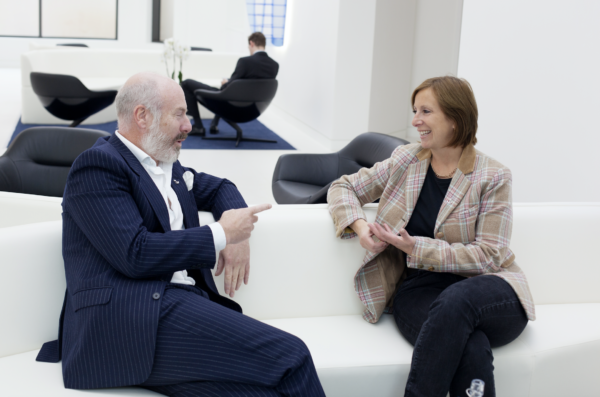
A sibling power duo in the UK workspace sector, Niki and Giles Fuchs have deep roots in the now-booming industry. Co-founders of Office Space in Town, with seven locations in the UK, the two were raised in the business and now operate one of the standout workspace brands.
I chatted with them about the inspiration for their themed workspaces in London, how owning their buildings is a primary differentiator in the city’s crowded market, and the importance of supporting space managers in their own development.
Cat Johnson: In the London workspace ecosystem, how do you differentiate Office Space in Town?
Niki Fuchs: We own our buildings, which is one differentiator. We don’t have the same restrictions that leaseholders have. We’re able to spend far more on our fit-out: the quality of our soundproofing; we have control over our mechanical and electrical (M&E), and the quality of M&E that goes in; and we have control over the infrastructure of the IT, which makes a difference.
We fit out our buildings for a 20 year life span, we strip back to core and then refit, with new lifts, new M&E to enable clients to have control in each of their offices and enhanced soundproofing to give clients more privacy than our competitors. We are able to put the highest specification of cabling and comms rooms with secure cabinets for each client’s IT hardware. It also means that every time we buy a new building we can review what went well with the last fit-out and are continuously striving to improve the finished article and add to the services and facilities and products we can offer our clients.
We have control over the building for wellness, as well, including quality of air. Our newest building has a new window system called View—we’re the first in the UK to install it—that is completely reactive to the sunlight so you don’t need blinds. It’s just phenomenal. Each office can control their window through an app so they can have it from complete black out to no tint at all, but still see out of the window and enjoy the views.
We’re able to do a lot more in terms of fit-out, as well as design. When you’re a tenant within a multi-occupancy building you’re limited to what you can do. We have a lot more scope in all those areas. It also enables us to control the main entrance, so we have control over the client experience from the moment they walk in the door, which not all operators have.
Because we’re a small company, we’re very focused on our staff and their development. We don’t just hire staff for them to do a job, we’re very much engaged in their personal development. We see ourselves as part of their journey to achieving what their purpose in life is—what they’re aspiring to. As long as we get some great input from them whilst they’re with us, we don’t see the be-all and end-all just teaching them to do the job. That makes them much more engaged, much more eager to learn, very much more eager to provide an excellent service to our clients.

Will you tell me about your business partnership? I understand that—Giles—you find buildings, negotiate and work with investors—and Niki—you handle running the spaces and training the staff. Is that correct?
NF: I listened to a podcast recently about great leaders of companies that have been successful for the longest periods of time. It turns out that boards of directors hire their CEOs or their managing directors (MDs) based on them being extroverts, because that’s what they think they need. But actually, extroverts, when doing the one job of MD, aren’t that successful because they forget to look inward. What Giles and I have managed to do is, I look inward as MD, and Giles looks outward as CEO. So our company gets the benefit of both of our strengths.
Giles Fuchs: Niki is the traditional managing director in as much as she runs all the managers, does the training, runs all the centres. She deals with the smooth running of the operational business. My role is to think strategically. Currently money is very cheap. We have a good amount of debt—about 40 percent loan to value in our portfolio. Given it’s so cheap, I persuaded our partners that we should go for long-term money. So we’re about to take seven years money rather than the traditional three or four. I’m really about finance, raising it, creating the strategy.
NF: And helping with the love.
GF: And helping with the love.
I have yet to meet another sibling business partnership in the workspace industry. I imagine others exist, but I haven’t connected with them yet. How did your partnership come about?
G: Our mother founded the industry in 1979. Niki had worked for her and become MD of that company. Toward the end of that company, before she sold it, I joined her and helped prepare it, then she sold it. I learned the business modeling at that point.
Then in 2009-2010, we opened our first new centre in London. Very quickly it spiraled, and Niki came in and rescued me. She took over the reigns of running the business day-to-day.
You previously operated City Executive Centres together and, I understand, learned quite a bit from the experience. How did it inform your work with Office Space in Town?
GF: From my point of view, I really did learn about the business modeling of serviced offices. I remember, when I joined Niki, trying to understand how it all hung together, and telling my father–who had written the business model—saying serviced offices don’t work. He sent me back to remodel the business and finally I worked it out. I learned, absolutely, how this business worked and, more importantly, how it didn’t work.
NF: Which was?
GF: Primarily, you have to be involved with the property—the building. That was fundamental. The lease model didn’t work—with the downturn anyway. Niki learned different things.
NF: There are three models: leased, managed and owned. City Executive Centres was a management company that set up and managed serviced offices on behalf of landlords and tenants. We learnt from working with clients who either owned or leased that the only model that worked was to own the building as Giles says. Our company only got a management fee and success bonuses, so we knew that we had to be involved with the property.
I also learned that the people in control of your center had to be defacto MDs. They had to own the business emotionally and have control to make decisions for the clients on the ground. You needed a flat management structure to ensure client satisfaction at the highest level. It was also, as I’ve said, important that you didn’t look at staff as a commodity, but as an organic part of your business. Only if you considered them in that way did you get 100 percent engagement.
It’s about happiness. You have to provide your staff with an environment they want to be part of, that they could influence, that they benefited from as a person, that became part of their purpose in life and part of their journey, in which they are respected.
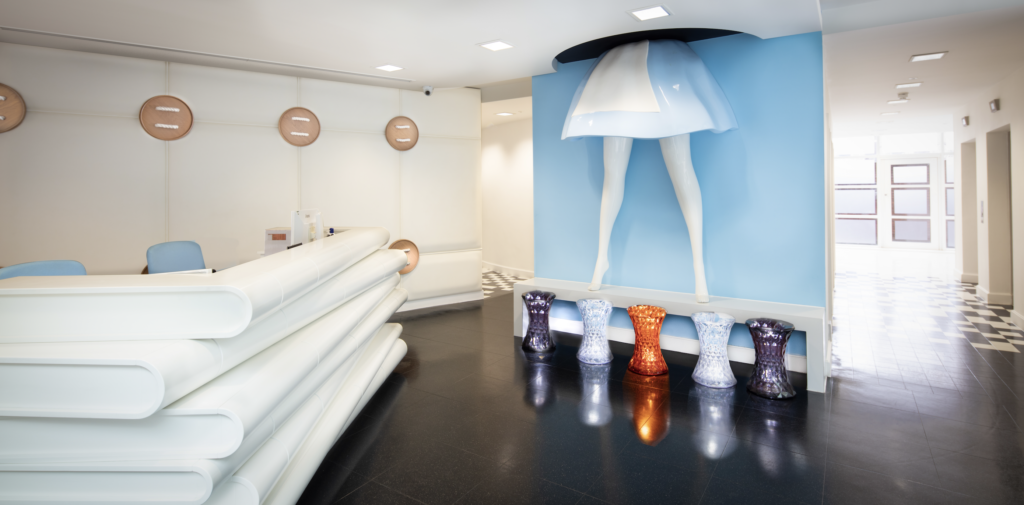
I have to ask about the Alice in Wonderland-themed space. How did that come about?
GF: We realized that the business environment was hugely important. We’d already designed the first three centres beautifully, but unthemed. The Cardiff office was designed with the co-founder of Jeffery West Shoes, Guy West. The shoes are business with a funky, edgy turn to them. He came and said our office was very average and a bit like a magazine and that we needed to get out there a bit more.
When we came to Waterloo, I asked our new designer to come back to me with something that would really stand out. She came back with the Alice in Wonderland theme. Initially, everyone was very worried. And we were advised by the whole industry, in fact, that we shouldn’t do it. The designer and I spent many hours discussing what the wrong side of the line was, and what the right side of the line was. I think it’s fair to say that we got absolutely on the right side of the line.
And now all the spaces are themed?
GF: We then retrospectively did Euston and Liverpool Street. With Liverpool Street, after many attempts, we finally got it right. You know it’s right when it’s right. The designer came in and said, “It’s right,” and put a Monopoly theme in front of me, and I said, “Absolutely, that’s exactly right.” Monument is sunseeker yachts, Mayfair is art deco/Great Gatsby, and Blackfriars is happiness.
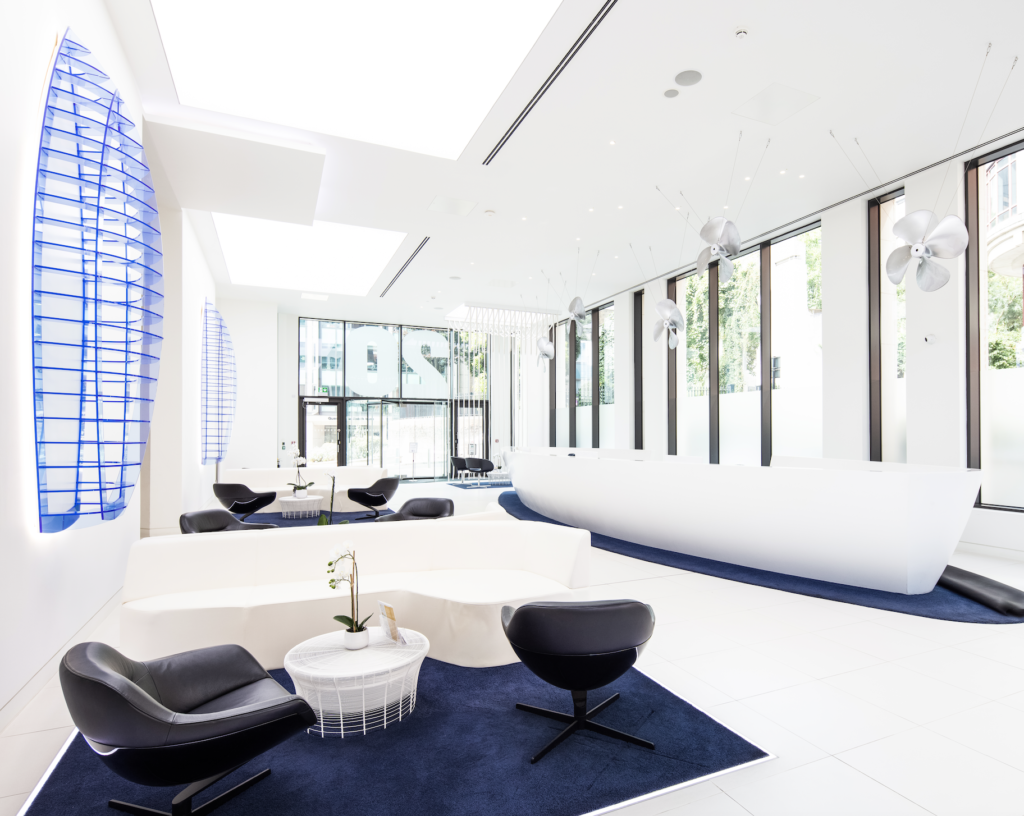
How do you approach filling your spaces? Who do you attract and how do you aim to serve them?
NF: We work really hard on generating our own leads through our website, but we have excellent relationships with the online brokers and the commercial agents that work within our industry. Those relationships are really important to us in filling our centres. We try not to approach it from a corporate—let’s entertain them and throw a lot of money at them—angle.
We work on a one-to-one basis with the agents, ensuring they know who our GMs are, what they have available and, most importantly, we ensure that our GMs have excellent conversion rates so the agents know that if they send us a lead we will convert it for them.
We work very hard making our website attractive and visual, we do organic SEO, we have a very good PR company we work with. We work very hard with our clients and we get an awful lot of referrals.
Our general managers, as MDs of their centres, are responsible for the commercial success of their buildings. If they are not getting enough leads to make the sales they need, they go out and find the business, through client referrals, networking, database activity etc.
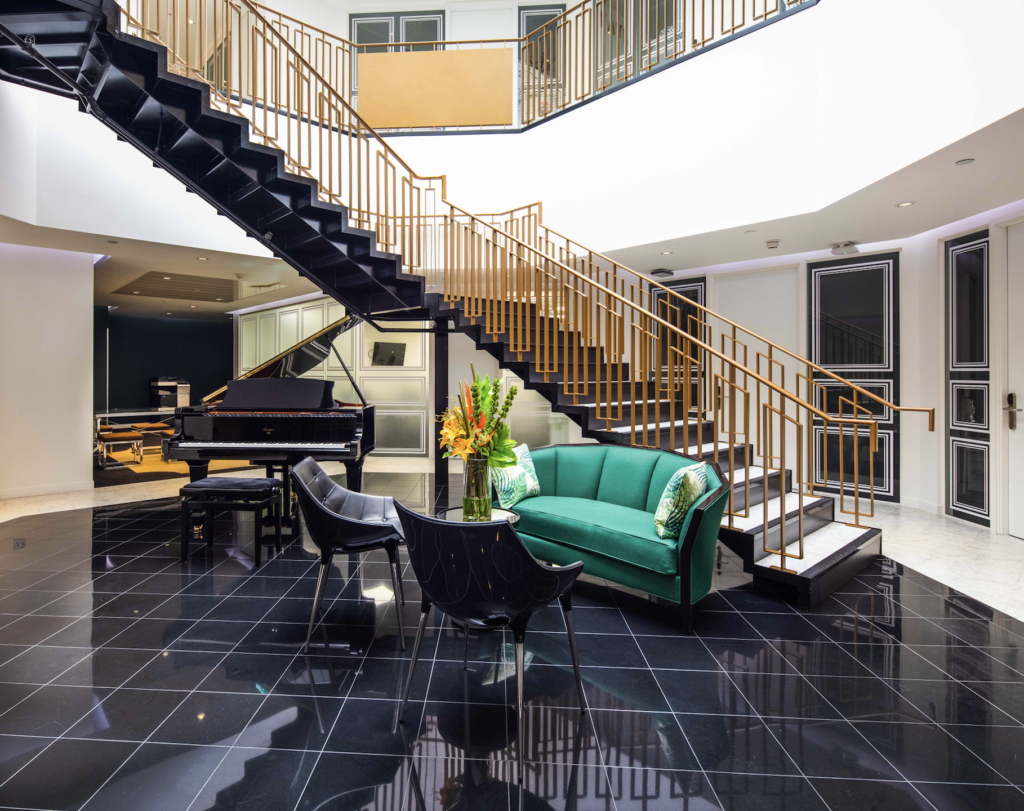
Are your spaces all offices? Do you have open coworking or dedicated desks?
NF: The majority of our space is dedicated offices. We don’t have what we’d call coworking. We have breakout space/coworking spaces for our clients so they can work away from their offices or in a collaborative environment if they want to. We ensure that our centres have lots of meeting pods as well so clients can use them as free meeting areas.
We have two cafes—one with a rooftop terrace at our Monument centre and one with a roadside terrace at our Waterloo centre, we also have roof terraces at our Liverpool Street, Mayfair, Blackfriars and Cardiff centres and St Paul’s has a large private patio area outside. We have two gyms, one at Liverpool St and one at St Pauls. We also have many meeting rooms at all of our centres all designed, decorated and fitted out to give clients a stimulating environment with easy-to-use and reliable technology.
Do you limit how much space one tenant can take up?
NF: We do, it’s 15 percent currently on the size of buildings we have. We are always reviewing this to reflect the market and the individual centre.
Is that for cultural reasons or financial reasons to minimize your risk?
NF: It started as financial, but it is cultural, as well. If you get large clients, they take over the culture of the building and it can also affect the quality of the product. If you have one large client on a floor with a few smaller clients, the shared facilities get overwhelmed and the other clients feel ousted as well as unhappy.
On your Core Values page, you talk about Office Space in Town reflecting who you are as people, and the ethics and morals you live by. How do you bring your values and personalities to the brand and spaces?
NF: It’s not just our personalities and purpose and values—it’s those of our staff, as well. We work very closely with them, and we hire people who share our moral positions in life. In this year’s 360 reviews, 85% of the people asked what they want to do in the next 12 months, said that they wanted to help others. This is we believe is the essence of OSiT.
GF: We’re very focused on who we are and what we provide. Every single member of staff is vetted, even after the manager has decided who they want to give the job to. The manager chooses a shortlist of candidates and we vet them and either veto them or not veto them depending on how they interact in our meeting.
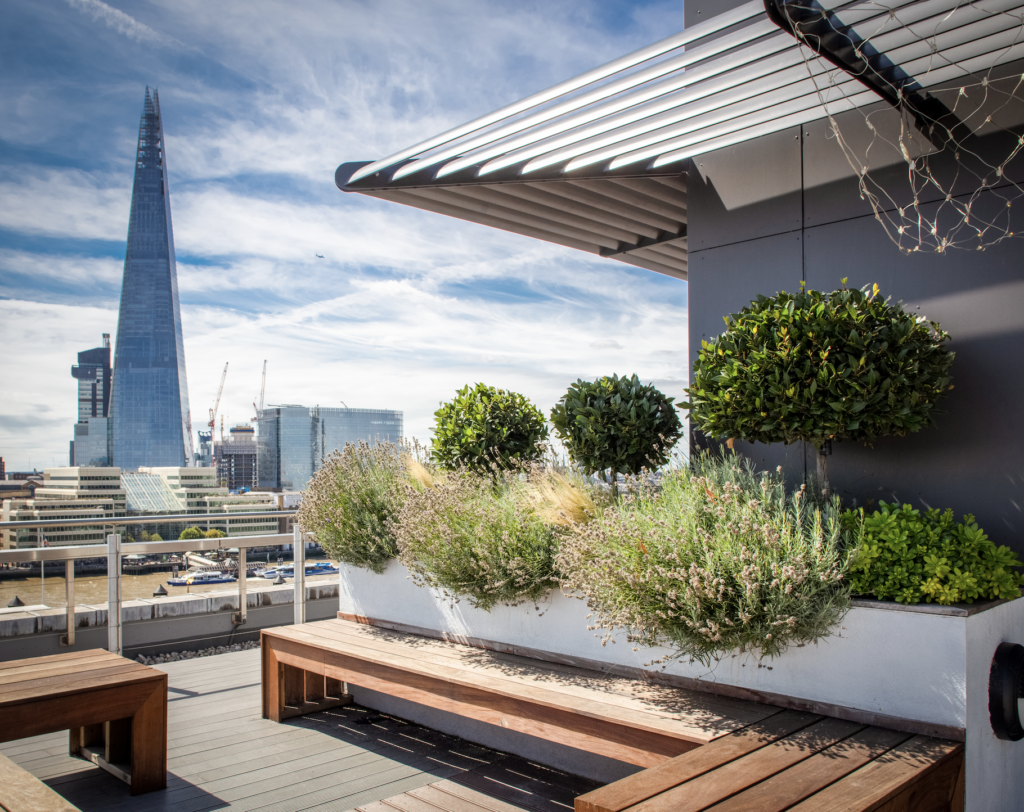
The workspace industry is booming right now—especially in London, but around the world. What do you see happening, both positive and potentially negative, and what would you like to see from this industry moving forward?
GF: Our mother started our first serviced office in 1979, with two and a half thousand square feet. The biggest change is that they are now much, much bigger. Our biggest is 65,000 square feet. The buildings are just getting bigger and bigger. Niki envisions a future of the model where the buildings are 250,000 square feet. They are served with serviced offices, managed space, and traditional leases. They all feed off each other and interact with B2B services, be it a coffeehouse, hairdressing, conferences, restaurant, etc. Niki coined the phrase SEMOB: service enhanced multi-occupied building.
Anything to add to that, Niki?
NF: Giles may disagree. We led the market in a lot of the changes in London, with a mix of us putting in what we think the client needs, and also driven by what our clients say they want and need as their businesses change.
We believe that in London the cost of living, travel time to work, congestion in public transport and roads is what is affecting people’s lives more and more. So the 25s to 35s want to live near where they work to maximise their work-life balance. Then when they have a family they are happy to make the sacrifice of the congestion, cost and time for space. Therefore, there is a growing need to have somewhere people can maximise their time once they have arrived at work both for the over 35s and the under 35s—just for different reasons.
If you had one piece of advice to someone opening a workspace, what would it be?
NF: Don’t think it’s going to go to plan.
GF: Underestimate your business plan. It will take twice as much money and take twice as long.
What’s your vision for Office Space in Town moving forward, in terms of growth and scaling?
NF: We’re actively looking for buildings; we have money to buy buildings. We don’t intend to take over the world. We don’t really see ourselves, at this moment in time, going beyond 10-15 centres. We do what we do well, we have a structure that works well, we have an amazing team who we wish to continue to develop and help them reach their career aspirations through our growth. We don’t intend to be WeWork or Spaces or TOG [The Office Group].
Is there anything either of you would like to add?
GF: We have confidence in the market. We believe we’re seeing just the tip of the iceberg, in terms of occupation. It was initially startup businesses, then smaller businesses, then medium size, now enterprise businesses. Then we saw it spreading across London and the UK, which is growing every month. We saw the international market coming to major cities—London in our case—and now around the world. The current size of the market is tiny compared to where it ends up.
Niki and Giles Fuchs will be interviewed live on stage at GCUC UK 23-24 September. Reserve your tickets now to join the conversation.
[ssba-buttons]
